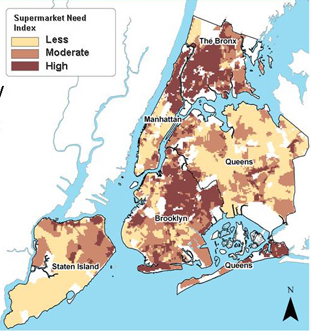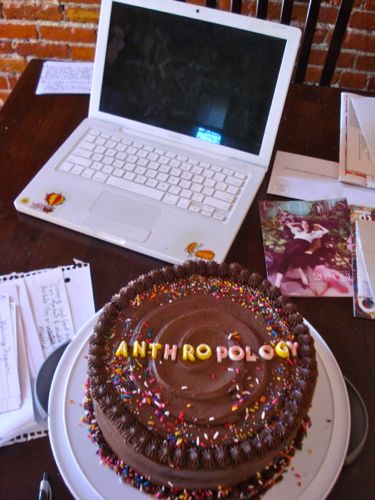 Supermarket need in NYC from Going to Market: New York City’s Neighborhood Grocery Store and Supermarket Shortage.
Supermarket need in NYC from Going to Market: New York City’s Neighborhood Grocery Store and Supermarket Shortage.
Food Studies features the voices of 11 volunteer student bloggers from a variety of different food- and agriculture-related programs at universities around the world. You can explore the full series here.
I packed a salad with Jersey white corn, roasted sweet potatoes, and goat’s milk feta for lunch on the first day of my second year of graduate school in New York University’s Food Studies Program. (Don’t we all mark important days with something equally special to eat?)
My concentration at NYU is in food systems – that is, the way that food travels from field to plate. I am working to find ways to make food businesses that are doing the right thing for the planet and their customers as financially sustainable as they are environmentally sustainable.
The delivery of my first CSA distribution in my junior year of college was the beginning of my obsession with the state of the American food system. My love of all things American extends from food to novels (my undergraduate degree is in American literature) and music as well: Melville, bourbon, barbeque, and surf rock. I have worked on an organic farm and tested recipes in restaurant kitchens, and it took me a few years to realize that just because I want to work in food doesn’t mean I have to work with food.
As I start my second year, I think that my professors can sense my and my fellow graduate students’ generalized anxiety. All of us — including, it seems, my fellow Food Studies blogger Erin — are grown ups who are trying to navigate the question of what to be when we grow up. How do we make this love of food really work for us? Fortunately, our professors have picked up on this, and are promising to impart plenty of real-world skills alongside their food-related insights.
This semester, I’ll be focusing on one practical skill in particular — business-oriented food writing — as well as getting grounded in food policy, which is something I’ve felt was lacking in the program so far. Meanwhile, my professor for Food Systems I: Agriculture is determined to give those of us who are not math inclined (hand-raise) the basic tools to use statistics and data to back up our ethics. In practice, this means we’ll be collecting and analyzing data to better understand food deserts in New York.
And finally, I am taking an overview class that promises to introduce us to current issues in food culture and systems globally. I’m anticipating discussions about commercial fishing, immigrant labor, global hunger, and the consequences of over-nutrition — and I’m looking forward to keeping you posted on all of it, from my most successful packed lunches to the most interesting readings!


